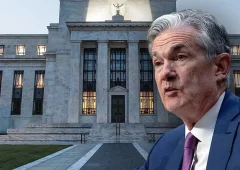Donald Trump Blames Biden Administration for Recent Market Crash
06.08.2024 10:30 1 min. read Alexander StefanovFinancial markets are in chaos, with Donald Trump attributing the crash to Kamala Harris and the Biden administration.
Over $2 trillion vanished from traditional markets within the first trading hour, and the crypto sector is experiencing extreme turbulence reminiscent of 2021.
Online brokerages like Charles Schwab, Fidelity, and Vanguard faced technical issues, impacting thousands of users. Bitcoin has dropped over 16%, and Ether has seen its sharpest decline since 2021.
Massive sell-offs have resulted in the liquidation of 305,759 traders, amounting to $1.22 billion, dragging Bitcoin below $50,000.
On Truth Social, Trump blamed the market collapse on Harris and Biden, claiming their inept leadership caused the crisis. He presented voters with a stark choice: return to “Trump prosperity” or face the “Kamala Crash” and a potential Great Depression in 2024, along with the threat of World War III.
As tensions rise in the Middle East, fears of a larger conflict are spreading on social media, with frequent advisories contributing to global market instability. Traders are grappling with an atmosphere of escalating uncertainty and rumors of war.
-
1
Ripple Faces Legal Setback as Court Rejects Bid to Ease Penalties
26.06.2025 16:54 1 min. read -
2
Coinbase Surges 43% in June, Tops S&P 500 After Regulatory Wins and Partnerships
29.06.2025 21:00 2 min. read -
3
Ripple Has Applied for a National Banking License
03.07.2025 7:00 2 min. read -
4
What Will Happen With the Stock Market if Trump Reshapes the Fed?
29.06.2025 13:00 2 min. read -
5
Top 10 Biggest Crypto Developments This Week
12.07.2025 22:00 3 min. read
Charles Schwab to Launch Bitcoin and Ethereum Trading Soon, CEO Confirms
Charles Schwab is preparing to roll out spot Bitcoin and Ethereum trading, according to CEO Rick Wurster during the firm’s latest earnings call.
BlackRock Moves to Add Staking to iShares Ethereum ETF Following SEC Greenlight
BlackRock is seeking to enhance its iShares Ethereum Trust (ticker: ETHA) by incorporating staking features, according to a new filing with the U.S. Securities and Exchange Commission (SEC) submitted Thursday.
IMF Disputes El Salvador’s Bitcoin Purchases, Cites Asset Consolidation
A new report from the International Monetary Fund (IMF) suggests that El Salvador’s recent Bitcoin accumulation may not stem from ongoing purchases, but rather from a reshuffling of assets across government-controlled wallets.
Sberbank Moves to Dominate Russia’s Crypto Custody Sector
Sberbank, Russia’s largest state-owned bank, is preparing to launch custody services for digital assets, marking a significant expansion into the country’s evolving crypto landscape.
-
1
Ripple Faces Legal Setback as Court Rejects Bid to Ease Penalties
26.06.2025 16:54 1 min. read -
2
Coinbase Surges 43% in June, Tops S&P 500 After Regulatory Wins and Partnerships
29.06.2025 21:00 2 min. read -
3
Ripple Has Applied for a National Banking License
03.07.2025 7:00 2 min. read -
4
What Will Happen With the Stock Market if Trump Reshapes the Fed?
29.06.2025 13:00 2 min. read -
5
Top 10 Biggest Crypto Developments This Week
12.07.2025 22:00 3 min. read


